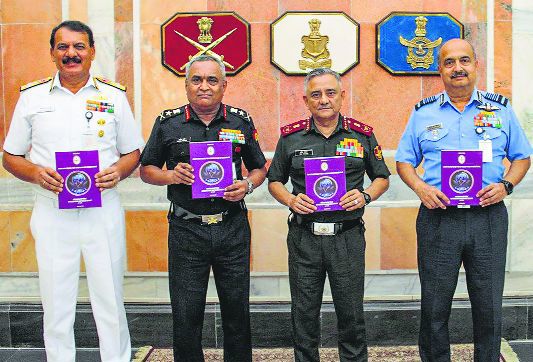Transformative defence reforms must have clarity
ON taking charge for the second time as Defence Minister, Rajnath Singh announced his first 100 days’ action plan: welfare of veterans, atmanirbharta and increasing defence exports to Rs 50,000 crore by 2028-29. There was no mention of theaterisation, even though he had said last month that it was “progressing, with consensus emerging among the three services”. In its election manifesto, the BJP made a commitment to implement theaterisation — without specifying a timeline. On May 10, the Inter-Services Organisation (Command, Control and Discipline) Act was promulgated through a gazette notification.
The then CDS, Gen Bipin Rawat, told me days before his death in a helicopter crash in December 2021 that he was tasked to prepare a blueprint for theaterisation in three years, coterminous with his tenure. Gen Anil Chauhan, who was appointed CDS in September 2022, was also given a three-year term and has made progress on theaterisation with a refined Integrated Theatre Command (ITC) plan. The CDS has become synonymous with theaterisation. At a book release event last month, Gen Chauhan said the National Security Policy/Strategy was not needed in a written form, adding that “we have policy processes, otherwise how did we resolve Article 370, did Balakot, handle Covid…” This is the first time anyone from the establishment has said that a written National Security Strategy (NSS) is not needed. The IAF considers the NSS a prerequisite for theaterisation. Early this month, Lt Gen Virendra Vats, Commandant, Defence Services Staff College (DSSC), Wellington, addressing the 80th Staff Course, explained the nuts and bolts of the NSS as a key ingredient of national security. The DSSC is training 40 triservice officers for ITCs and a one-star-rank officer has been posted to an ITC, the location of which is not known. Last week, Gen Chauhan released the triservice Joint Doctrine for Cyberspace Operations.
In April, a triservice conference was organised for “generating fresh ideas, initiatives and reforms for propelling jointness and integration”. A triservice brainstorming session was held in May in the Old War Room, South Block, to assess the state of a transformed theaterised force capable of multi-domain operations. Twelve sub-committees made presentations on ITCs. On May 21, speaking at the United Service Institution of India’s annual Maj Gen Samir Sinha Memorial Lecture on ‘Jointmanship: The Way Ahead’ in New Delhi, Gen Chauhan stated that Operation Tiranga had helped in ironing out differences with service Chiefs over 11 meetings, each three to four hours long.
He spoke about joint culture 2.0 distilled from the best in each service. Operational commands will be independent of administrative functions of ‘raise’, ‘train’ and ‘sustain’, the residual functions of service Chiefs. He said the ITC would lead to the next step in defence reforms like cyberspace, space and artificial intelligence. He noted that there were differences over reforms, without specifying any, but emphasised that theaterisation was ‘imminent’.
Some wrinkles have to be ironed out. On the operational side, it’s the merging into ITCs of two Integrated Battle Groups created in 9 Pivot Corps and five IBGs (integrated battle groups) in 17 Mountain Strike Corps, raising a new Corps in the Central Command which will be absorbed in the China-specific ITC at Lucknow against the PLA Western Theatre Command, fixing operational ORBAT (order of battle) of the Pakistan-specific ITC at Jaipur, and allotting naval and air assets to the Integrated Maritime Command at Visakhapatnam or Karwar. The IAF’s resistance to the division of air assets persists. Following revocation of their operational command, the role of service Chiefs will be limited to training, morale and logistics. Reducing the existing 17 single-service three-star commands into three- or four-star ITCs will require locating eminent slots for the dispossessed. Giving one land-based ITC to the IAF will restore some of its assets.
The CDS is currently wearing multiple hats — Chairman, Chiefs of Staff Committee; Adviser, National Command Authority; Secretary, Department of Military Affairs; single point of advice to the Defence Minister; head of all triservice institutions and unified commands like the Strategic Forces Command and the Andaman & Nicobar Command; and lead member of the Defence Acquisition Council. He will require a Vice CDS and additional deputies if he is also to figure in the command chain of the ITCs.
Significantly, theaterisation will require political guidance, conspicuously absent from the Indian military system. Leave alone any NSS or White Paper, a political directive to the Chiefs of Staff Committee or service Chiefs has rarely been issued. The then Defence Minister’s operational directive of 2009 was prepared by the Director General of Military Operations. In his yet-to-be-published memoirs, former Army Chief Gen MM Naravane has reportedly narrated an incident during Operation Snow Leopard on the intervening night of August 29-30, 2020, when he asked the Defence Minister, External Affairs Minister, the National Security Adviser (NSA) and the CDS for clarification on orders to open fire (he was told by the highest authority not to be the first to open fire) against Chinese tanks approaching Kailash heights. No one responded, till two hours later he was informed by the Defence Minister that the PM had said that since it was a military situation, he should do what he thought best. This exemplifies the bane of unwritten operation orders.
It is quite inconceivable that transformative defence reforms are in the pipeline without even a Strategic Defence and Security Review and an NSS/NSP. Recently, former NSA Shivshankar Menon said an NSS was prepared not once but thrice during the UPA rule, but was never released due to a lack of political will. Even now, two drafts of the NSS, one prepared by the Integrated Defence Staff and the other by the National Security Council Secretariat in 2021-22, are with the NSA; they only need to be updated. Unfortunately, political will is missing on theaterisation.









